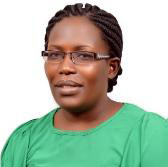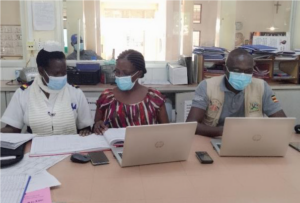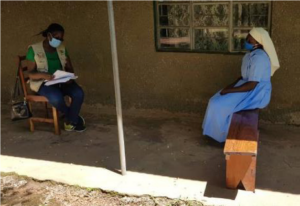 |
Patricia ThiweBEHS, MPH (MUK) Host Site: National Malaria Control Division, Ministry of HealthHost Mentor: Dr. Damian Rutazaana Dr. Daniel Kyabayinze |
||
ABOUT THE FELLOWPatricia Thiwe holds a Bachelor of Environmental Health Science and Master of Public Health from Makerere University, School of Public Health. During her two years of the fellowship, she was hosted at the National Malaria Control Division (NMCD), Ministry of Health where she was part of the team that is charged with malaria prevention and control in Uganda. Patricia gained skills in Epidemiology including disease outbreak investigation, response to public health emergencies, design and implementation of operational research, data analysis, scientific writing, and communication among others Prior to joining the fellowship programme, Patricia worked as an Assistant District Health Officer- Environmental Health in Nebbi District where she oversaw environmental health services in the district. Achievements at the Host Site
Fellowship program specific achievements
Conference Presentations
Publications and manuscripts written Manuscripts:
Newspaper articles
Epi-bulletin articles in the National Institute of Public Health quarterly bulletin:
Summary of Epidemiological Study:Title: Investigation of a COVID-19 cluster among attendees of a farewell party at a church, Omoro District, Uganda, 2020 Background: On 2 October 2020, a cluster of COVID-19 infections was reported in Omoro District, Northern Uganda. Despite government directives banning public gatherings, many infected persons had reportedly attended a farewell party at Church X on 5 September. We investigated to determine the source of infections, understand the outbreak magnitude, and identify risk factors for transmission. Methods: We defined a case as a positive PCR for SARS-CoV-2 virus in a respiratory sample from an Omoro District resident, taken from 4 September to 5 October 2020. We developed a line list by reviewing records and interviewed the index case-patient, church farewell party attendees, and several community members to ascertain possible exposures. We conducted a retrospective cohort study among the 62 farewell party attendees. Results: We identified 23 confirmed case-patients (74% male; median age 36 years) in Omoro District, including 12 in the Church X cluster. Illness onsets ranged from 23 August to 29 September. Fifteen (24%) farewell party attendees were infected. The index case, Mr. A, was a businessman active in Church X with onset on 23 August. Mr. A had no travel history but had multiple traveller clients. He attended the farewell party and multiple Church X services in August. In total, 17 (74%) case-patients had exposure to Mr. A. The second case-patient, Mr. B, had onset on 1 September. He was also active in Church X, frequently interacted with Mr. A, and attended the farewell party. All 23 cases had contact with Mr. A, Mr. B, or their contacts. Close contact with Mr. A (RR=2.4; 95% CI=1.1-5.8) or Mr. B (RR=2.6; 95% CI; 1.2-6.7) at the farewell party was associated with infection. Conclusion: A social event at a church and lack of adherence to government directives provided an opportunity for spread of COVID-19. Improved adherence to national guidelines and government directives for COVID-19 and enforcement of adherence to standard operating procedures for COVID-19 could avert similar clusters in the future. Key words: COVID-19, cluster, Church, Uganda Key lessons learnt during the fellowship
Next StepsI am looking forward to further my career I field Epidemiology through service with the Ministry of Health and/or other organizations that will allow me leverage the knowledge, and skills obtained during this training. Pictorial
|
|||
Sign in
Sign in
Recover your password.
A password will be e-mailed to you.


